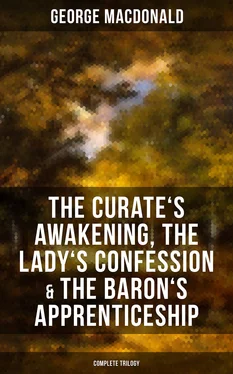"I like the fellow," he said. "He says what he means, fair and full, and no shilly-shallying. It's all great rubbish, of course!"
And the widow of the dean of blessed memory had not a word to say in defence of the sermon, but, for her, let it go as the great rubbish he called it. Indeed, not knowing the real mind of her nephew, she was nothing less than gratified to hear from him an opinion so comfortably hostile to that of this most uncomfortable of curates, whom you never could tell where to have, and whom never since he had confessed to wrong in the reading of his uncle's sermons, and thus unwittingly cast a reproach upon the memory of him who had departed from the harassed company of deans militant to the blessed company of deans triumphant, had she invited to share at her table of the good things left behind.
"Why don't you ask him home to dinner, aunt?" said Bascombe, after a pause unbroken by Mrs. Ramshorn.
"Why should I, George?" returned his aunt. "Has he not been abusing us all at a most ignorant and furious rate?"
"Oh! I didn't know," said the nephew, and held his peace. Nor did the aunt perceive the sarcasm for the sake of pointing which he was silent. But it was not lost, and George was paid in full by the flicker of a faint smile across Helen's face.
As for Helen, the sermon had indeed laid a sort of feebly electrical hold upon her, the mere nervous influence of honesty and earnestness. But she could not accuse herself of having ever made a prominent profession of Christianity, confirmation and communion notwithstanding; and besides, had she not now all but abjured the whole thing in her heart? so that, if every word of what he said was true, not a word of it could be applied to her! And what time had she to think about such far-away things as had happened eighteen centuries ago, when there was her one darling pining away with a black weight on his heart!
For, although Leopold was gradually recovering, a supreme dejection, for which his weakness was insufficient to account, prostrated his spirit, and at length drove Mr. Faber to ask Helen whether she knew of any disappointment or other source of mental suffering that could explain it. She told him of the habit he had formed, and asked whether his being deprived of the narcotic might not be the cause. He accepted the suggestion, and set himself, not without some success, to repair the injury the abuse had occasioned. Still, although his physical condition plainly improved, the dejection continued, and Mr. Faber was thrown back upon his former conjecture. Learning nothing, however, and yet finding that, as he advanced towards health, his dejection plainly deepened, he began at length to fear softening of the brain, but could discover no other symptom of such disease.
The earnestness of the doctor's quest after a cause for what anyone might observe, added greatly to Helen's uneasiness; and besides, the fact itself began to undermine the hope of his innocence which had again sprung up and almost grown to assurance in the absence of any fresh contradiction from without. Also, as his health returned, his sleep became more troubled; he dreamed more, and showed by his increased agitation in his dreams that they were more painful. In this respect his condition was at the worst always between two and three o'clock in the morning; and having perceived this fact, Helen would never allow anyone except herself to sit up with him the first part of the night.
Increased anxiety and continued watching soon told upon her health yet more severely, and she lost appetite and complexion. Still she slept well during the latter part of the morning, and it was in vain that aunt and doctor and nurse all expostulated with her upon the excess of her ministration: nothing should make her yield the post until her brother was himself again. Nor was she without her reward, and that a sufficing one—in the love and gratitude with which Leopold clung to her.
During the day also she spent every moment, except such as she passed in the open air, and at table with her aunt, by his bedside, reading and talking to him; but as yet not a single allusion had been made to the frightful secret.
At length he was so much better that there was no longer need for anyone to sit up with him; but then Helen had her bed put in the dressing-room, that at one o'clock she might be by his side, to sit there until three should be well over and gone.
Thus she gave up her whole life to him, and doubtless thereby gained much fresh interest in it for herself. But the weight of the secret, and the dread of the law, were too much for her, and were gradually undermining that strength of dissimulation in which she had trusted, and which, in respect of cheerfulness, she had to exercise towards her brother as well as her aunt. She struggled hard, for if those weak despairing eyes of his were to encounter weakness and despair in hers, madness itself would be at the door for both. She had come nearly to the point of discovering that the soul is not capable of generating its own requirements, that it needs to be supplied from a well whose springs lie deeper than its own soil, in the infinite All, namely, upon which that soil rests. Happy they who have found that those springs have an outlet in their hearts—on the hill of prayer.
It was very difficult to lay her hands on reading that suited him. Gifted with a glowing yet delicate eastern imagination, pampered and all but ruined, he was impatient of narratives of common life, whose current bore him to a reservoir and no sea; while, on the other hand, some tales that seemed to Helen poverty-stricken flats of nonsense, or jumbles of false invention, would in her brother wake an interest she could not understand, appearing to afford him outlooks into regions to her unknown. But from the moral element in any story he shrunk visibly. She tried the German tales collected by the brothers Grimm, so popular with children of all ages; but on the very first attempt she blundered into an awful one of murder and vengeance, in which, if the drawing was untrue, the colour was strong, and had to blunder clumsily out of it again, with a hot face and a cold heart. At length she betook herself to the Thousand and One Nights, which she had never read, and found very dull, but which with Leopold served for what book could do.
In the rest of the house things went on much the same. Old friends and their daughters called on Mrs. Ramshorn, and inquired after the invalid, and George Bascombe came almost every Saturday, and stayed till Monday. But the moment the tide of her trouble began again to rise, Helen found herself less desirous of meeting one from whom she could hope neither help nor cheer. It might be that future generations of the death-doomed might pass their poor life a little more comfortably that she had not been a bad woman, and she might be privileged to pass away from the world, as George taught her, without earning the curses of those that came after her; but there was her precious brother lying before her with a horrible worm gnawing at his heart, and what to her were a thousand generations unborn! Rather with Macbeth she might well "wish the estate o' the world were now undone"—most of all when, in the silent watches of the night, as she sat by the bedside of her beloved and he slept, his voice would come murmuring out of a dream, sounding so far away that it seemed as if his spirit only and not his lips had spoken the words, "Oh Helen, darling, give me my knife. Why will you not let me die?"
CHAPTER V.
GLASTON AND THE CURATE.
Table of Contents
Outside, the sun rose and set, never a crimson thread the less in the garment of his glory that the spirit of one of the children of the earth was stained with blood-guiltiness; the moon came up and knew nothing of the matter; the stars minded their own business; and the people of Glaston were talking about their curate's sermons. Alas, it was about his sermons, and not the subject of them, that men talked, their interest mainly roused by their PECULIARITY, and what some called the oddity of the preacher.
Читать дальше












